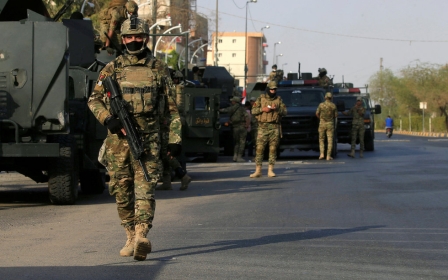Iraq parliament elects Sunni MP al-Halbousi as speaker, breaking deadlock

Iraq's parliament has elected Sunni member Mohammed al-Halbousi as speaker, marking an important step towards establishing a new government four months after an inconclusive national election.
Parliament had been due to elect a speaker and two deputies during its first meeting on 3 September, but failed to do so as lawmakers were unable to determine which competing bloc had the most seats.
The pro-Iran bloc led by Hadi al-Ameri's Conquest Alliance now looks positioned to take the lead after the election of its candidate Halbousi.
Halbousi's election on Saturday marks the start of a 90-day process outlined in the constitution, designed to eventually lead to a new government.
The lists elected during legislative polls must first form coalitions and then elect a new president.
The bloc with the most members appoints the prime minister and presides over the formation of the next government.
Halbousi defeated former defence minister, Khaled al-Obeidi, winning the position with 169 votes, according to MP Husham al-Suhail.
Iraq's parliament contains 329 seats.
Announcing the vote, the temporary leader of the assembly said Halbousi, 37, had become the youngest speaker of parliament in Iraq's history.
Before running in May's national election as a candidate on the Anbar Our Identity electoral list, Halbousi was the governor of Anbar province. He had previously served in Iraq's parliament, from 2014 to 2017.
Since Saddam Hussein was toppled in a 2003 US-led invasion, power has been shared among Iraq's three largest ethnic-sectarian components.
The prime minister has traditionally been a Shia Arab, the speaker of parliament a Sunni Arab and the president a Kurd.
Iraqis voted in May in their first parliamentary election since the defeat of Islamic State’s self-declared caliphate, but a contentious recount process delayed the announcement of final results until last month.
Obeidi was backed by the list of outgoing prime minister, Haider al-Abadi, who said on Thursday he would not seek a second term as his political support crumbled over the violence in Basra.
During the vote, Halbousi referred to the crisis in Basra and pleaded for "real reforms".
Basra has been at the epicentre of protests that broke out in July in the southern province before spreading to other parts of the country.
Anger in Basra flared earlier this month over a growing health crisis, after more than 30,000 people were hospitalised by pollution in the city's water supply.
Protesters flooded the streets for five days, clashing with security forces and torching the provincial headquarters, the Iranian consulate and the offices of armed groups.
Twelve demonstrators were killed in the clashes, with rights groups accusing security forces of using excessive force.
Stay informed with MEE's newsletters
Sign up to get the latest alerts, insights and analysis, starting with Turkey Unpacked
Middle East Eye delivers independent and unrivalled coverage and analysis of the Middle East, North Africa and beyond. To learn more about republishing this content and the associated fees, please fill out this form. More about MEE can be found here.




